Diagnosing and managing common dog skin issues is essential for your pet's well-being. Start by observing symptoms like excessive scratching, redness, or unusual odors. Allergies, parasites like fleas and ticks, and infections are typical culprits. Bacterial and fungal infections often require veterinary diagnosis and treatment. For minor issues, home remedies like oatmeal baths or coconut oil can provide relief. Regular grooming and a clean environment can help prevent many skin problems. Stay attentive to changes in your dog's skin health, and you'll discover effective strategies for keeping them comfortable and happy. More insights are just ahead!
Understanding Dog Skin Anatomy
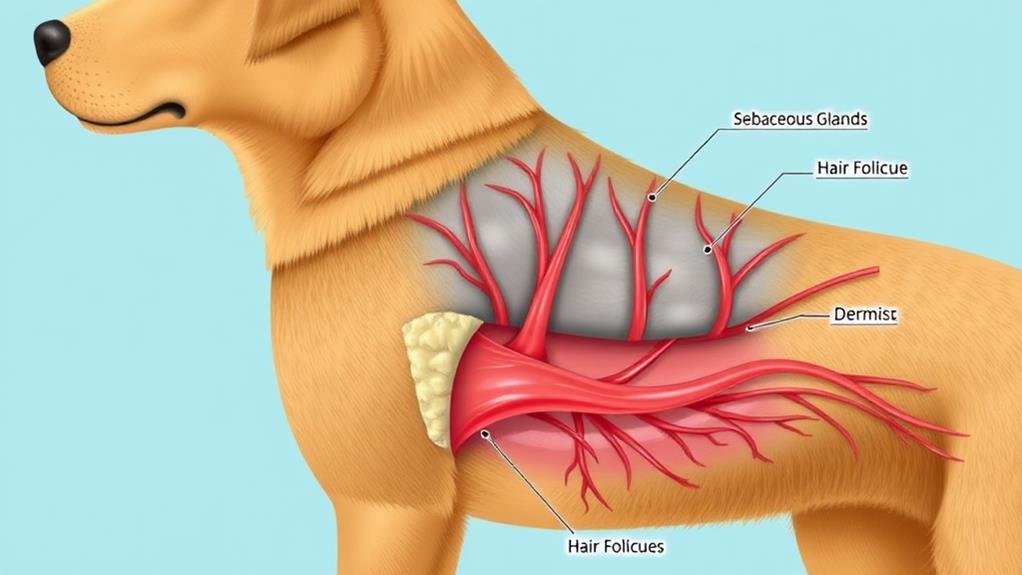
Have you ever wondered what makes your dog's skin unique? Your dog's skin is more than just a protective barrier; it plays an indispensable role in their overall health. It's packed with layers, including the epidermis, dermis, and subcutaneous tissue. Each layer serves a specific purpose, from protection against environmental threats to regulating body temperature.
The epidermis is the outermost layer, providing a shield against bacteria and irritants. Within this layer, specialized cells produce melanin, which gives your dog's skin and coat color.
The dermis, located just beneath, contains blood vessels, hair follicles, and nerve endings, playing a pivotal role in sensation and circulation. This layer also houses sebaceous glands that produce oil, keeping the skin moisturized.
Common Symptoms of Skin Problems
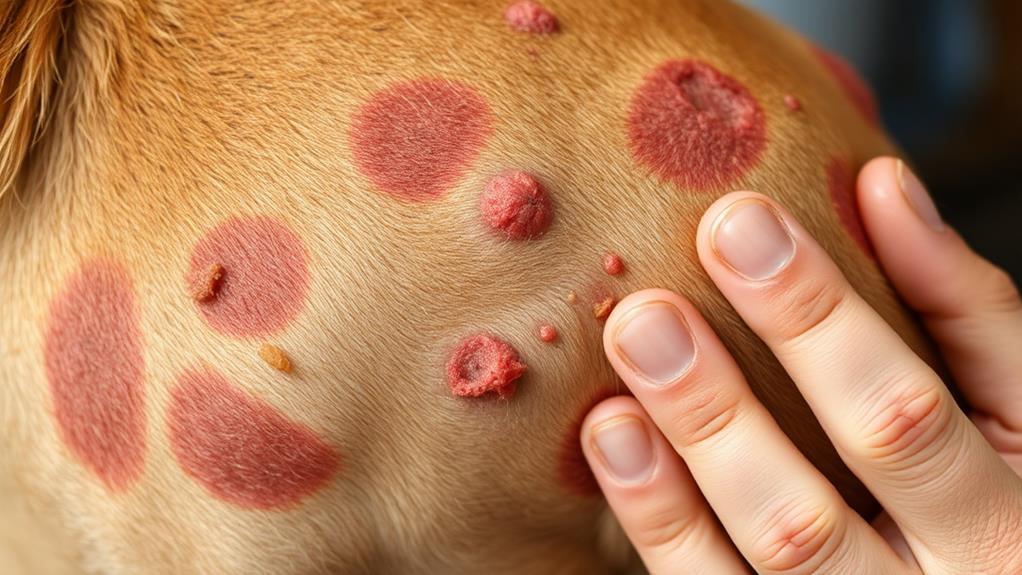
When it comes to your dog's health, recognizing the common symptoms of skin problems is essential. Early detection can make a significant difference in treatment and your dog's overall well-being. One of the most noticeable signs is excessive scratching or biting at the skin. If your dog seems to be constantly itching, it may indicate an issue that needs attention.
You might also observe redness, swelling, or inflammation in specific areas, which can signal irritation or infection. Furthermore, hair loss, whether localized or widespread, can point toward underlying skin problems. Pay close attention to any unusual odors coming from your dog's skin, as this could suggest a bacterial or fungal infection.
Additionally, flaky, dry patches or changes in skin texture can indicate issues like dermatitis. If your dog develops any bumps, lumps, or sores, don't ignore them; these may require veterinary evaluation. Lastly, changes in your dog's behavior, such as increased lethargy or decreased appetite, can also be associated with skin problems. By staying vigilant and noting these symptoms, you can ensure your furry friend receives the care they need promptly.
Allergies and Skin Reactions
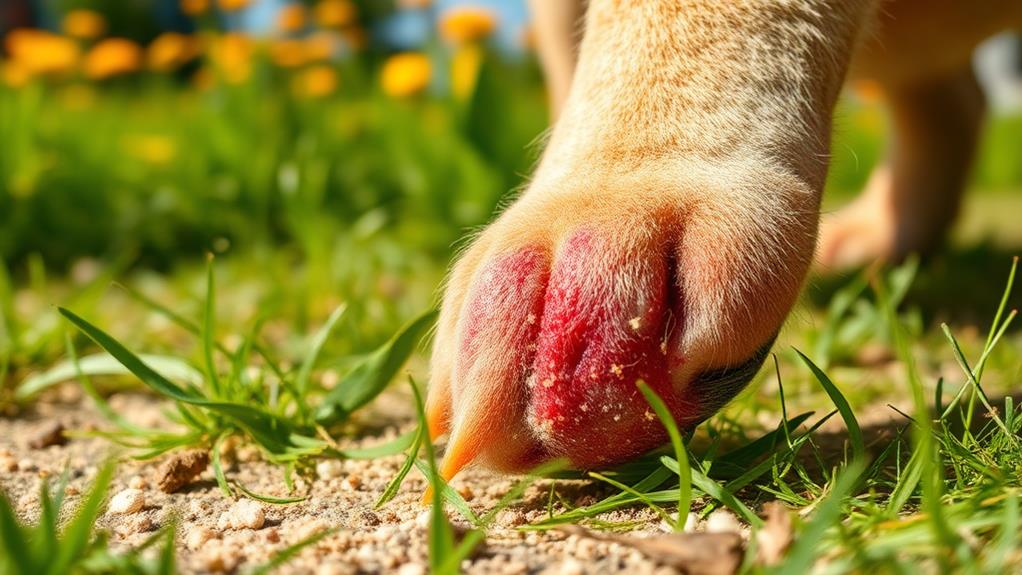
Allergies are a common culprit behind many skin reactions in dogs, often manifesting as the symptoms you've just observed. These reactions can result from food, environmental factors, or contact allergens. As a responsible pet owner, recognizing the signs early will help you manage your dog's discomfort effectively.
Here's a quick reference to help identify different types of allergies and their potential symptoms:
| Allergy Type | Common Triggers | Symptoms |
|---|---|---|
| Food Allergies | Grains, proteins, dairy | Itching, vomiting, diarrhea |
| Environmental | Pollen, dust mites, mold | Itchy skin, sneezing, watery eyes |
| Contact Allergies | Chemicals, fabrics | Redness, swelling, rashes |
If you suspect allergies, consult your veterinarian. They may perform tests to pinpoint the specific allergy and recommend treatment options, such as dietary changes, antihistamines, or topical ointments. By addressing allergies promptly, you can help your furry friend feel more comfortable and improve their quality of life. Remember, understanding your dog's specific needs is key to effective management.
Parasites and Their Impact
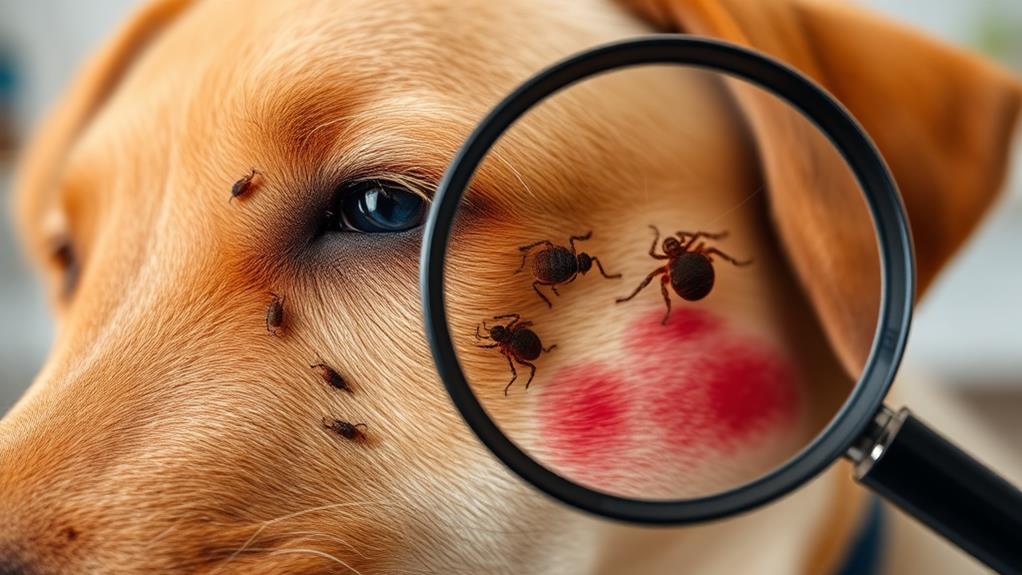
Dealing with parasites can be a frustrating experience for both you and your dog. Fleas, ticks, and mites can cause significant discomfort and lead to serious skin issues. Fleas, for instance, can trigger intense itching, causing your dog to scratch and bite at their skin, which may result in hot spots or even infections. Ticks not only irritate the skin but can also transmit diseases that affect your dog's overall health.
You'll want to keep an eye out for signs of infestation, like excessive scratching, biting, or unusual behavior. Regular grooming can help you identify these pests early. If you suspect your dog has parasites, consult your veterinarian for appropriate treatments, such as topical applications or oral medications.
Prevention is key. Make sure to use veterinarian-recommended flea and tick preventatives, and keep your dog's living environment clean and free of debris where these pests thrive. Also, be cautious when taking your dog to areas where parasites are common, like wooded or grassy regions. By staying proactive, you can protect your dog from the discomfort parasites can cause and maintain their skin's health and itch-free condition.
Bacterial and Fungal Infections
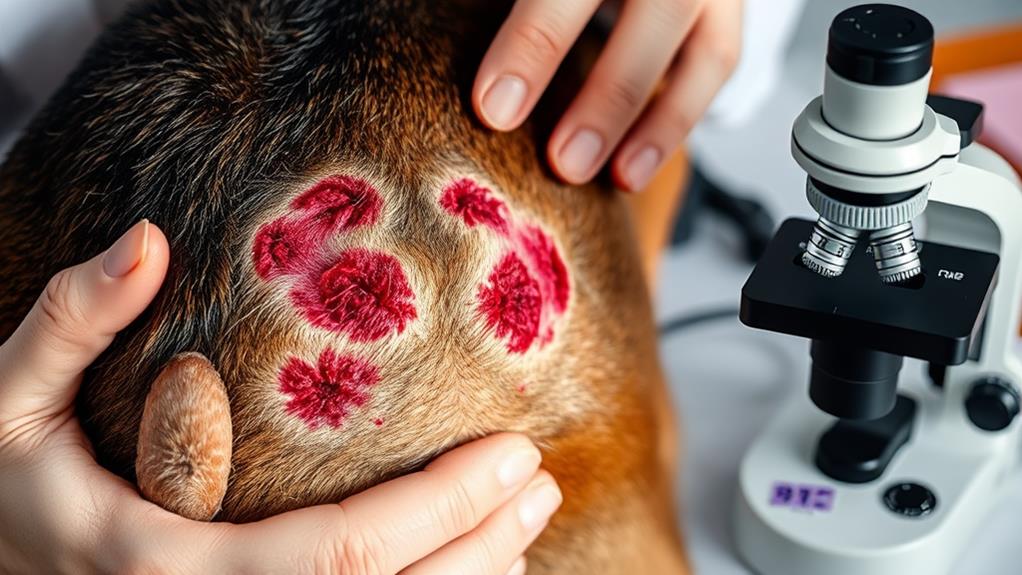
Bacterial and fungal infections can pose serious threats to your dog's skin health. These infections often arise from minor wounds, allergies, or underlying skin conditions. You might notice symptoms like redness, swelling, or discharge, which can indicate an infection. In some cases, your dog may also exhibit excessive scratching, biting, or licking of the affected area, leading to further irritation.
Common bacterial infections include pyoderma, characterized by pus-filled bumps or sores, while fungal infections like ringworm can cause circular patches of hair loss. If you suspect your dog has either type of infection, it's indispensable to consult your veterinarian promptly. They'll perform a thorough examination and may recommend tests to determine the exact cause.
Treatment usually involves topical or oral antibiotics for bacterial infections and antifungal medications for fungal issues. Keeping your dog's skin clean and dry can help prevent these infections. Additionally, addressing any underlying conditions, such as allergies, is pivotal for long-term skin health. Regular grooming and hygiene practices will also aid in reducing the risk of infections, ensuring your furry friend stays comfortable and healthy.
Identifying Skin Tumors
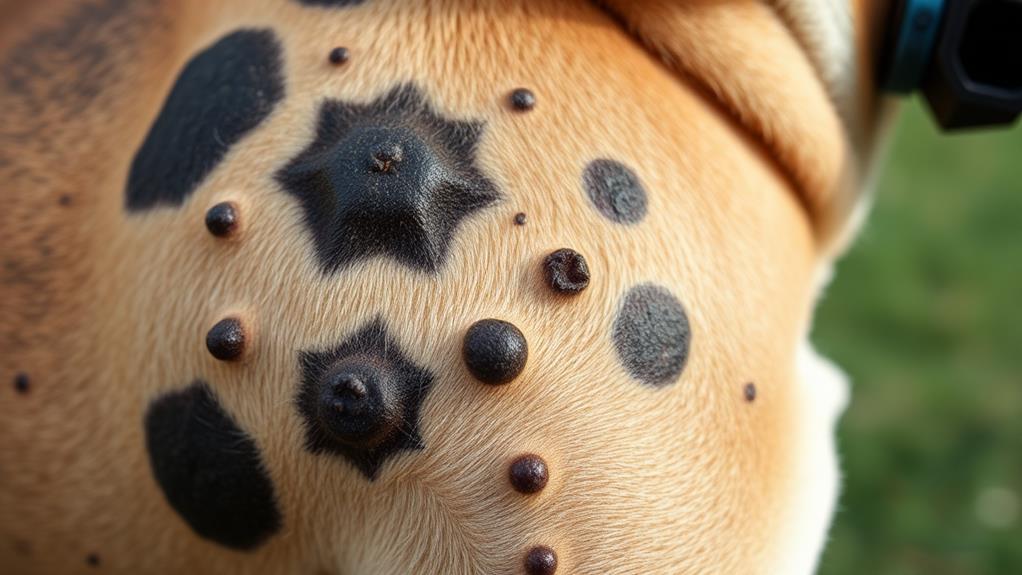
Skin tumors in dogs can be alarming for pet owners, as they may indicate serious health issues. It is crucial to know how to identify these tumors early on. Keep an eye out for changes in the skin, such as new growths, bumps, or sores that don't seem to heal. Tumors can appear in various forms, including lumps or discolored patches.
To help you identify potential skin tumors, here's a quick reference table:
| Type of Tumor | Appearance | Common Locations |
|---|---|---|
| Lipoma | Soft, movable lump | Under the skin |
| Mast Cell Tumor | Firm, raised, or ulcerated | Abdomen, limbs |
| Squamous Cell Carcinoma | Scaly, red, or crusty | Head, ears, paws |
If you notice any suspicious changes, don't hesitate to consult your veterinarian. They can perform a proper assessment and, if necessary, conduct a biopsy to determine the nature of the growth. Early detection is key in managing skin tumors effectively, so stay vigilant and proactive about your dog's health.
Home Remedies for Minor Issues

After addressing more serious concerns like skin tumors, it's important to recognize that not all skin issues in dogs require veterinary intervention. Minor irritations such as dry skin, minor rashes, or flea bites can often be treated at home.
First, consider using a gentle oatmeal bath. It soothes itchy skin and can help relieve discomfort. You can easily make this by grinding plain oats into a fine powder and adding it to your dog's bathwater.
If your dog has dry skin, a small amount of coconut oil can work wonders. Simply rub it into your dog's skin and coat, and watch it moisturize and nourish.
For minor rashes, a cool compress can help reduce inflammation and provide relief. Just make sure to keep the area clean and dry.
Finally, if fleas are the issue, try a mixture of water and apple cider vinegar in a spray bottle. Lightly mist your dog's coat, avoiding the eyes, to help repel those pesky pests.
Always monitor your dog's condition, and if things don't improve, consult your veterinarian for further guidance.
Veterinary Treatments and Options
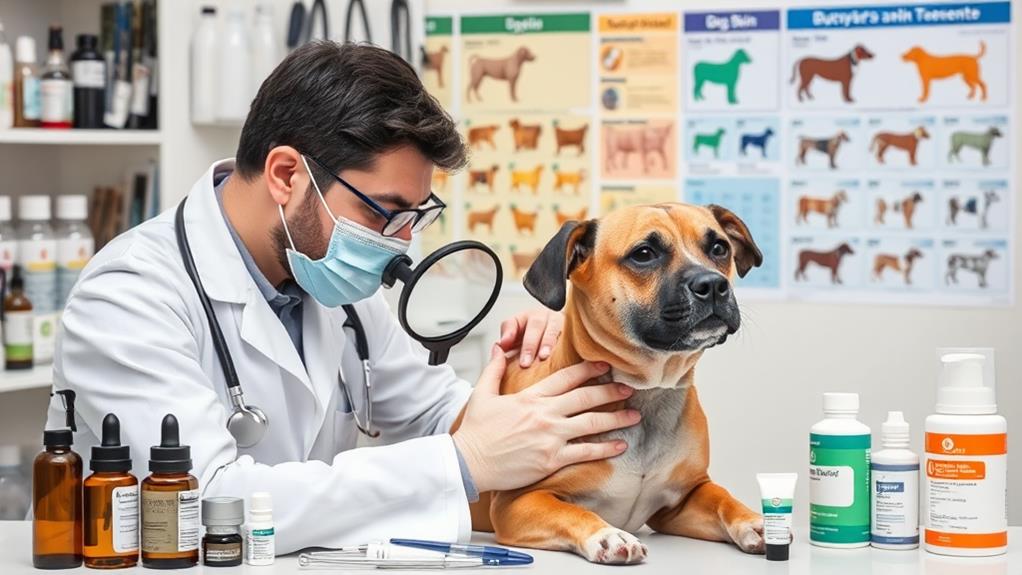
When it comes to managing more serious dog skin issues, veterinary treatments can provide effective solutions tailored to your pet's needs. Your veterinarian will start by diagnosing the underlying cause of the skin problem through a thorough examination and potentially some tests, like skin scrapings or allergy tests.
Once they've a clear diagnosis, they'll recommend specific treatments. These might include medicated shampoos to soothe irritations, topical ointments for localized issues, or oral medications to tackle infections or allergies. If parasites are involved, your vet may prescribe treatments to eliminate fleas or mites.
In some cases, your dog might need a special diet to address food allergies, which your vet can help you navigate. For chronic skin conditions, long-term management strategies may involve regular check-ups and adjustments to the treatment plan as needed.
Lastly, your veterinarian might suggest supplements, like omega fatty acids, to improve skin health and coat condition. By working closely with your vet, you can find the right combination of treatments that will help your furry friend feel comfortable and healthy again.
Preventive Care for Skin Health
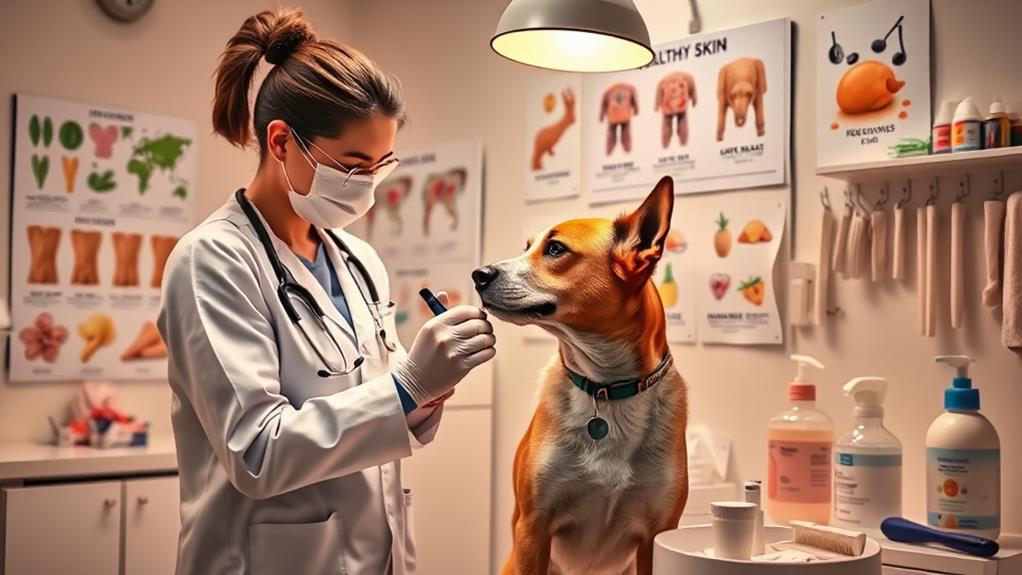
Maintaining your dog's skin health requires proactive measures that can prevent issues before they arise. Start by ensuring a balanced diet rich in essential fatty acids, vitamins, and minerals. High-quality dog food can help promote a healthy coat and skin. Don't forget to keep your dog hydrated, as proper water intake is crucial for skin health.
Regular grooming is essential too. Brush your dog's coat frequently to remove dirt, debris, and loose fur. This not only helps reduce matting but also stimulates skin oils that keep the coat shiny and healthy. Bathing is important, but don't overdo it; too many baths can strip natural oils. Use a gentle, dog-specific shampoo when you do bathe.
Check your dog's skin regularly for any signs of irritation, redness, or unusual bumps. Early detection can save you a lot of trouble later on. Finally, keep your dog's living environment clean and free from allergens like dust and pollen. Regularly wash their bedding and avoid heavily scented cleaning products. By staying vigilant and proactive, you can help keep your dog's skin healthy and problem-free.
When to Seek Professional Help
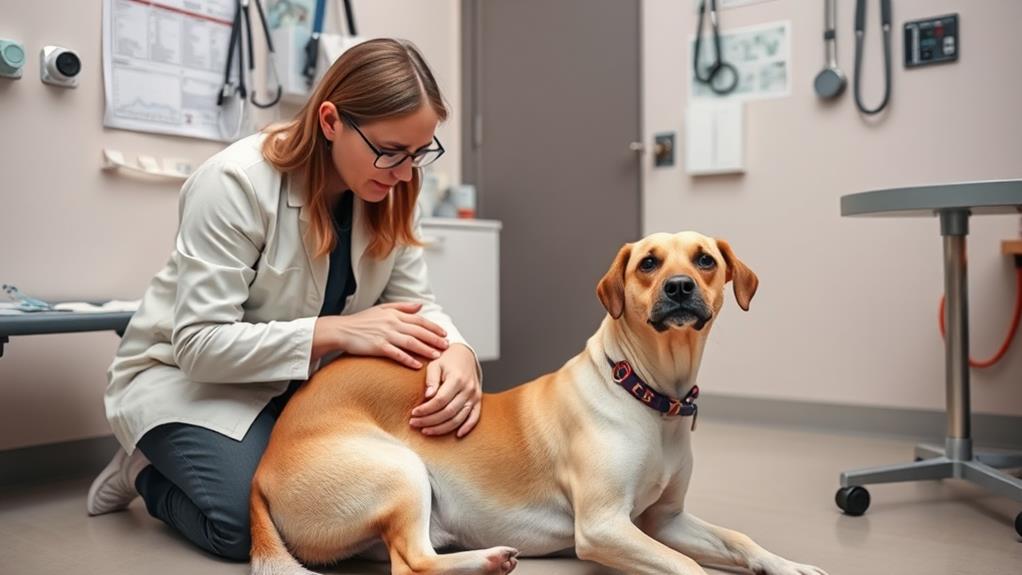
Recognizing the signs that your dog's skin needs professional attention is essential for their overall health. If you notice persistent itching, redness, or inflammation, it's time to consult a veterinarian. These symptoms could indicate allergies, infections, or other underlying issues that require a professional diagnosis.
Also, keep an eye out for unusual hair loss or bald patches. If your dog's coat looks unhealthy or patchy, don't hesitate to seek help. Skin lesions, sores, or any growths should definitely raise a red flag, especially if they seem to worsen over time.
When your dog's skin issues affect their quality of life—like excessive scratching or discomfort—professional intervention is critical. You know your dog best, so trust your instincts; if something feels off, it probably is.
Additionally, if home remedies or over-the-counter treatments aren't improving the situation within a few days, it's time to reach out to a vet. They can provide tailored treatment plans and necessary medications that you can't access without a prescription. Remember, early intervention can prevent more serious health problems down the line.
Frequently Asked Questions
Can Dog Skin Issues Be Hereditary or Genetic?
Yes, dog skin issues can be hereditary or genetic. If your dog's parents had skin problems, there's a chance your dog might inherit those traits, leading to similar conditions later in life.
How Does Diet Affect Dog Skin Health?
Your dog's diet plays an essential role in skin health. Nutrient-rich foods boost hydration and support the skin barrier. Omega fatty acids, in particular, help reduce inflammation and promote a shiny, healthy coat.
Are Certain Dog Breeds More Prone to Skin Issues?
Certain canines, particularly those with compact coats, like Bulldogs and Dachshunds, often experience skin struggles. You'll find that genetics and breed characteristics play vital/essential/paramount roles in your dog's susceptibility to such issues.
What Environmental Factors Contribute to Skin Problems?
Environmental factors like pollen, dust mites, mold, and harsh chemicals can trigger skin problems in dogs. You should monitor your dog's surroundings, minimize exposure, and maintain a clean environment to help prevent these issues.
Can Stress Cause Skin Problems in Dogs?
Stress can act like a storm cloud over your dog's health, triggering skin issues such as itching and irritation. If you notice changes in their skin, it's worth exploring their emotional well-being and environment.
Conclusion
In summary, keeping your dog's skin healthy means comprehending its requirements, recognizing the signs of trouble, and acting promptly. Monitor for allergies, combat parasites, and treat infections swiftly. Embrace home remedies for minor issues and consult your vet for persistent problems. Preventative care, like regular grooming and proper nutrition, goes a long way. By staying attentive and proactive, you'll ascertain your furry friend enjoys a happy, itch-free life. Your dog's skin health is in your hands!



